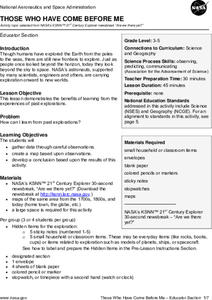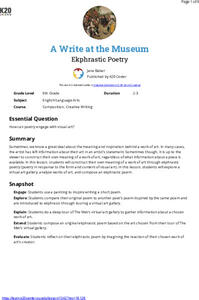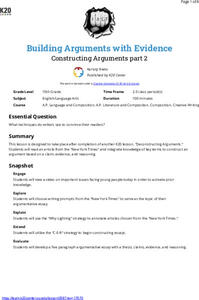NASA
Cleaning Water
Give young scientists a new appreciation of fresh, clean drinking water. After learning about the ways astronauts recycle their air and water, your class will work in small groups creating and testing their very own water filtration...
NASA
Let's Investigate Mars
Take your science class on a hypothetical field trip to Mars with an engaging astronomy lesson. After first learning about NASA's Mars rover missions, young scientists plan their own scientific investigations of Earth's nearest neighbor.
Curated OER
Those Who Have Come Before Me
Class members are transformed into explorers as they work in groups to locate hidden items and map their journey along the way. They then leave clues for other groups of students to follow, and ultimately discover how past explorations...
Baylor College
Do Plants Need Light?
Turn your classroom into a greenhouse with a lesson on plant growth. First, investigate the different parts of seeds, identifying the seed coat, cotyledon, and embryo. Then plant the seeds and watch them grow! Measure the new plants...
Baylor College
What's Is Soil Made Of?
It's time to roll up those sleeves and get a little dirty in the second lesson of this series on the science of food. Investigate where plants and animals get the minerals they need to live in this two-part exploration of soil. First,...
Baylor College
What's That Food?
Get things cooking with the first lesson plan in this series on the science of food. Working in small groups, young scientists make and record observations about different mystery foods. These descriptions are then shared with the class...
Baylor College
Lungometer
Life science learners construct lung-o-meters from gallon-sized milk jugs and then measure their lung capacities. For older young scholars, have them graph the vital lung capacities of each person in the class. Cross-curricular pieces...
NASA
Cleaning Water
From their sweat to the water vapor in their breath, astronauts recycle every possible drop of water while in space. After watching a short video describing the different ways materials are recycled and reused in space shuttles, young...
Global Oneness Project
Highways and Change
What is the cost of change? Roberto Guerra's photo essay "La Carretera: Life and Change Along Peru's Interoceanic Highway" asks viewers to consider the impacts of the 1,600 mile-long highway through Peru and Brazil that connects Pacific...
Generation Rx
My Generation Rx: Plot Twists
How can prescription drugs be dangerous if they were prescribed by a doctor? Is it okay to share your prescription drugs with friends if they really need them? Clear up any common misconceptions about prescription drugs with a set of...
Kenan Fellows
Industrial Knowledge of Acids and Bases
Over a 10-year period, EPA regulations cost businesses less than $30 billion, while businesses saved over $82 billion. Scholars experiment with acids and bases to better understand the pH scale. Then they debate environmental regulation...
K20 LEARN
Antigone's Themes Today: The Greek Drama Antigone
Is Antigone relevant to today's readers? After reading Sophocles' tragedy, scholars must decide if the themes are universal and timeless. Class members engage in a series of activities designed to have them closely consider the...
K20 LEARN
A Write At The Museum: Ekphrastic Poetry
Which came first—the painting or the poem? In this case, it is the painting. Scholars closely examine a work of art and then craft an ekphrastic poem in response. A carefully scaffolded nine-page plan leads young poets through the process.
K20 LEARN
Allow Me To Introduce Myself: Writing A Letter Of Introduction
"Who am I?" is not only a great philosophical question that requires a lot of reflection but is also at the heart of a letter of introduction. The challenge, of course, is figuring out where to start. Middle schoolers get a little help...
K20 LEARN
Active Or Passive?—"The Monkey's Paw": Grammar/Language Usage
Don't you wish you could use passive voice? Be careful what you wish for! "The Monkey's Paw" is the focus of a grammar and language usage lesson about active and passive voice. Readers identify examples of active and passive voice in...
K20 LEARN
(Not Quite) Breaking All The Rules: Poetry And Grammar
FANBOYS will enjoy breaking grammar rules, but they will have to use coordinating conjunctions, gerunds, compound sentences, compound-complex sentences, and even predicates as they craft poems like Shel Silverstein.
K20 LEARN
#Summarize: Summarizing
What are the effects of one's life experiences? Class members view a slam poetry reading, a speech by President Obama, and read a short story by John Steinbeck about responding to tragedies. They summarize these events and then craft a...
K20 LEARN
Being Mindful Of Sadness In "The Scarlet Ibis": Theme And Characterization
James Hurst's short story "The Scarlet Ibis" provides readers with an opportunity to consider how they can support others who are experiencing distress. Participants learn self-care tips and connect to the short story's characters. They...
K20 LEARN
A Way With Words: Copy Editing And The Writing Process
Learning to edit copy using correct grammar and mechanics is an essential skill in school—where scholars are called upon to edit their peers' writing—and in business. Class members practice this skill by first editing a provided article...
K20 LEARN
Building Arguments With Evidence: Constructing Arguments Part 2
The second session in the two-part "Building Arguments with Evidence" lesson asks scholars to craft an argument essay on a topic of interest to them. Writers establish a claim, locate evidence, and justify their stance.
K20 LEARN
Blackout Poetry: Re-Envisioning Writing
Introduce young poets to Blackout Poetry. Much like Found Poems, Blackout Poetry challenges scholars to rethink the process writers may use to craft their poems. After watching a short video in which poet Austin Kleon describes his...
K20 LEARN
Building To 100: Building And Decomposing Numbers
Following a catchy video about decomposing numbers, young mathematicians build and write numbers using dice. Class members work to create an anchor chart that displays six ways to make numbers. Beans get scooped and estimated, then...
K20 LEARN
Friends, Romans, Countrymen, Lend Me Your Emotions: Julius Caesar
Scholars, high schoolers, class members! With the help of this lesson, you too can identify the three persuasive appeals (ethos, pathos, and logos) the characters in William Shakespeare's tragedy Julius Caesar used to convince their...
K20 LEARN
From Apples To Oranges: Examining Literary Devices
Make learning the definitions of literary terms memorable with a fun and engaging activity. Teams of scholars are given several terms and create an acrostic poem with simplified definitions and examples.
Other popular searches
- Spanish Grammar Worksheets
- Spanish Lesson Plans
- Spanish Christmas Activities
- Spanish Language
- Spanish Colors
- Spanish Explorers
- Spanish Literature
- Spanish Weather Activities
- Spanish Culture
- Spanish Speaking Countries
- Spanish Body
- Spanish American War

























